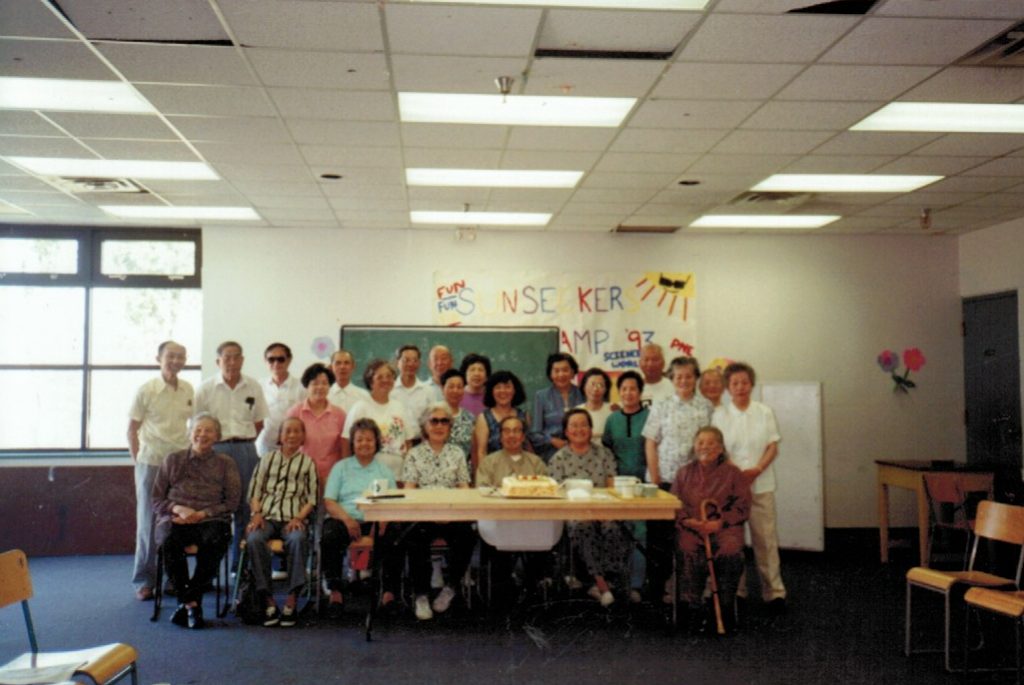One of the earliest childhood memories I can recall is watching my grandma’s back disappear into the distance as she shuffled across the street to catch the number 16 bus. As a child of no more than four or five years old, I never knew where she was going, attired in her quilted vests and floppy sun hats, but nonetheless I watched her depart every morning through the glass sliding door of my front balcony.
She always looked like she was going somewhere important. My po-po never stood up without reason, so watching her so purposefully walk away from the sanctuary of our house was quite a spectacle for my younger self. In my memories, she is always sitting down—eating, knitting, assembling photo albums, combing my hair into a ponytail. From the living room, I could hear the soft scuff of her walking shoes graze against our doormat; the whine of the door lock being twisted and the ache of the door opening as she ventured, wordlessly, off to a world completely unknown to me. It felt like she was embarking on quest, from the careful way she packed her handbag to the nonchalance she emanated as she shrugged on her jacket. She never said goodbye.
Up until and even long after her passing, I never solved the mystery of where she disappeared to almost every day. It seemed like such an obvious answer that I didn’t even want to ask anybody, and my curiosity soon faded in lieu of other trivial things, like growing up. I had very few memories of her; I was only six when her funeral took place. It was a dynamic point of my life, and I regret not taking more time to remember and reflect on my time with my grandma. I was entering elementary school; a new chapter of my life consisting of piano lessons, Chinese school, math homework, Scouts, obsession with indie rock and other bits and pieces of my adolescence. These things quickly overshadowed my inquisitivity and I almost forgot about the enigma altogether.
Eventually, I got my answer through an unexpected conversation with my mother. I was around 11 years old and finally starting to memorize the streets and neighbourhoods of Vancouver. My house was a 30-minute drive away from both my elementary school and my parents’ workplace, and I was beginning to question why we lived so far away from everything. It took my family at least 20 minutes by car to get anywhere important—work, school, our relative’s house, decent restaurants.
“Mom,” I said, “Why do we live here if the shop and my school are so far away?”
My mom didn’t look up as she continued sticking spare pins into a tomato-shaped pin cushion. She sat on her favourite orange leather rolling chair at her sewing machine, a Cantonese soap opera blaring obnoxiously from a portable DVD player beside her. I had just walked back to my parents’ curtain and window hardware store from school and was pestering them out of boredom, much to my mom’s annoyance.
She paused her episode. “If I could choose, I would want to live more west. But, everything’s too expensive now,” she replied curtly.
“Why didn’t you buy a house that was more west in the first place?” I asked.
“Because, we wanted a house that was close to Chinatown so your po-po could easily bus there by herself and play mahjong with her friends,” she replied.
Suddenly, my greatest childhood mystery was solved.
Chinatown never held much importance to me as a child. I remember long Saturday afternoons of grocery shopping, alleviated only by visits to Maxim’s for an omelette. My family doctor is situated in Chinatown, which was the only thing that brought me back to the neighbourhood throughout my childhood. At a certain period of time, my mom stopped grocery shopping there entirely. There were too many alternatives—the T&T on 1st Avenue or markets on Victoria Street. “Parking in Chinatown is too expensive,” she would say.
It wasn’t until I got older and started noticing the new, trendier businesses opening up in the area that I gave Chinatown another glance. My sisters and I would try out the new restaurants, and gradually I was reintroduced to the area—the grocery stores I had spent hours in as a child, the fish market that always scared me with its big tanks of crabs. It astounded me that this neighbourhood was the reason my family lived half an hour away from the rest of my life. It was this little community, now quickly dissipating in the face of gentrification, that my family’s first home in Canada is anchored around.
I now work in Chinatown on the weekends and spend a lot of time up and down Main Street in cafes and community centers. Sometimes I wonder if I was meant to find a job here— it felt like I was bound to return. My mother often picks me up after work and we stroll around the area, ambling into dried goods stores and meat butchers to say hi to old friends. Some visits are much more than just hi’s—I always find it amazing how quickly humans can speak when witnessing two old friends exhausting each other of all their family details upon reunion.
Regardless, I have undergone some degree of maturity from my previous days of endless complaints when I used to I tail my mom around Chinatown’s grocery markets (or so I like to think). During these occasional walks, where my mom would pick up the most unnecessary items simply to visit her friends (several pounds of pu-erh tea when she already had a hidden stash in her closet was the most extreme case), I noticed something in their banter. It was something indescribable, but I felt it in the cadence of their voices when they inquired about the other’s children, and in the pitchy, yet warm laughter that is reserved for long time friends. It is a deep sense of connection; the empathy that so many Chinese business owners share with one another because they know what it’s like. How hard it is.
While I complained about the half an hour drives to and from school, my parents and so many other Chinese parents out there were working tirelessly to ensure that their children could succeed in school. The dry, rough palms of their hands. The mountain of tax return forms, invoices, and insurance papers they spent hours deciphering because they never had the luxury of taking English classes. They did all of this, and more, so that we could thrive. The normalcy of their selflessness and tenacity translated into those conversations, where my mom and her friends would joke about back pains and expensive rent. They shared this with each other— the universal struggle for a good life. This, and many other similarities, bound them together, regardless of where they were geographically.
Sometimes, when I glance out the window of my workplace, I see flocks of older Chinese women saunter down the sidewalk together, pulling metal carts of groceries with them. I can sense that same look in their eye; the same laugh that my mother shares with her old friends. I often wonder if any of them played mahjong with my po-po.







